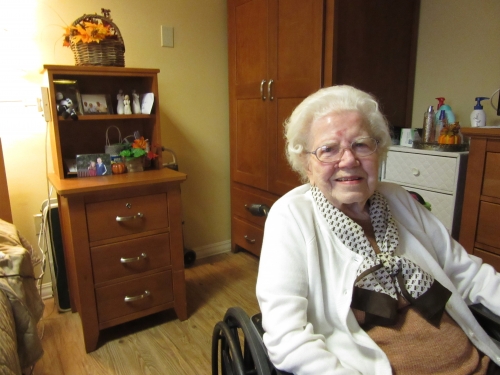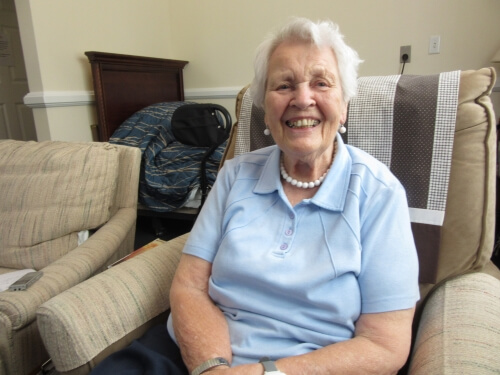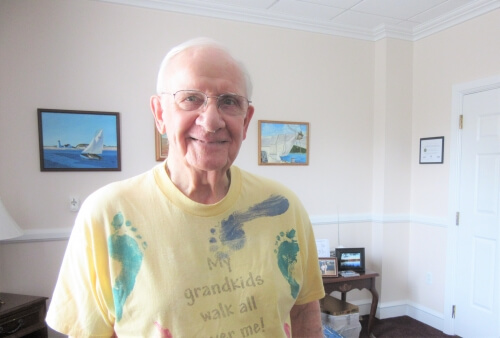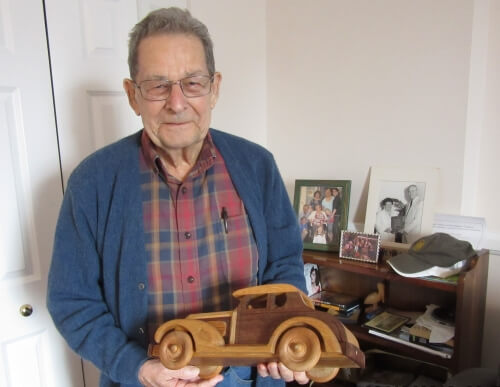Faye Dunkle: A resident steeped in Homeland history

Resident Faye Dunkle and her smile!
Faye Dunkle’s ties to Homeland Center go deep.
Before she found a home at Homeland, Faye would visit her sister and other relatives here. Her sister-in-law, Dottie Dunkle, served on Homeland’s volunteer Board of Managers and trusted Homeland with the care of her parents, sister and her husband, and even an uncle.
Faye has lived her whole life in Harrisburg and its environs. Her father owned a garage and her mother kept house for the family, including Faye, two brothers, and a sister.
“We had a wonderful family,” she recalls. “We were very close-knit.”
On Sundays, the family might go to a park or visit her mother’s sisters. Attending church was a definite.
“My father used to say Sunday wasn’t Sunday without going to church,” Faye says. For 80 years, she belonged to the same Methodist church in Harrisburg, until it closed.
When she was still in school, the family moved to Paxtang, a small community on the outskirts of Harrisburg. After she graduated from Harrisburg’s John Harris High School in 1941, jobs were hard to find. She was having lunch at a Paxtang restaurant with a friend when the friend’s father – the restaurant’s owner – came in and said that the Pennsylvania Farm Bureau had called. They had a job for Faye’s friend.
“Did you put in an application?” the friend asked. Faye hadn’t, but they were hiring and had offices right there in Paxtang. Faye went the next day and got a job that began a 42-year secretarial and support staff career with the agency.
“I loved it,” she says. “People didn’t leave because it was almost like a family. We were treated well. That’s why nobody left.”
Outside of work, Faye enjoyed dances, going out to eat, and traveling with friends from Maine to Florida.
When part of the Farm Bureau merged into the newly created Agway cooperative in the mid-1960s, Faye could have moved to Syracuse, but she chose to stay home.
“They had a lot of snow up there,” she said. “I didn’t care to move because I had relatives here. I had all these friends here.”
Faye’s father was 60 when he died, and Faye stayed home to help her mother. Faye’s mother showed her spunk, looking for work so she could manage financially. She ended up getting a job with a local funeral home, helping at the home and with the funeral director’s children while their parents worked.
In 2010, Faye came to live in a bright, comfortable Homeland personal care suite overlooking the solarium, but she remembers the previous decades when Homeland was very different, before construction of the skilled care and Ellenberger dementia units.
Her sister lived in skilled care exactly one room above the room where Faye lives now. Faye’s room is decorated in pleasantly seasonal fashion, with fall flowers and pumpkin figurines amid the family photos and a copy of the New Testament. Faye’s niece regularly visits, helping choose her stylish outfits for the week.
Faye always knew that Homeland would suit her.
“Everything is so nice and clean,” she says. “The people are friendly. You couldn’t find a better place.”

 Bob Hostetter loves history. He also loves iron-willed people who fight for change. His two loves converge at Homeland Center, founded in 1867 by a group of Harrisburg women determined to provide a home for widows and orphans left destitute after the Civil War.
Bob Hostetter loves history. He also loves iron-willed people who fight for change. His two loves converge at Homeland Center, founded in 1867 by a group of Harrisburg women determined to provide a home for widows and orphans left destitute after the Civil War.





